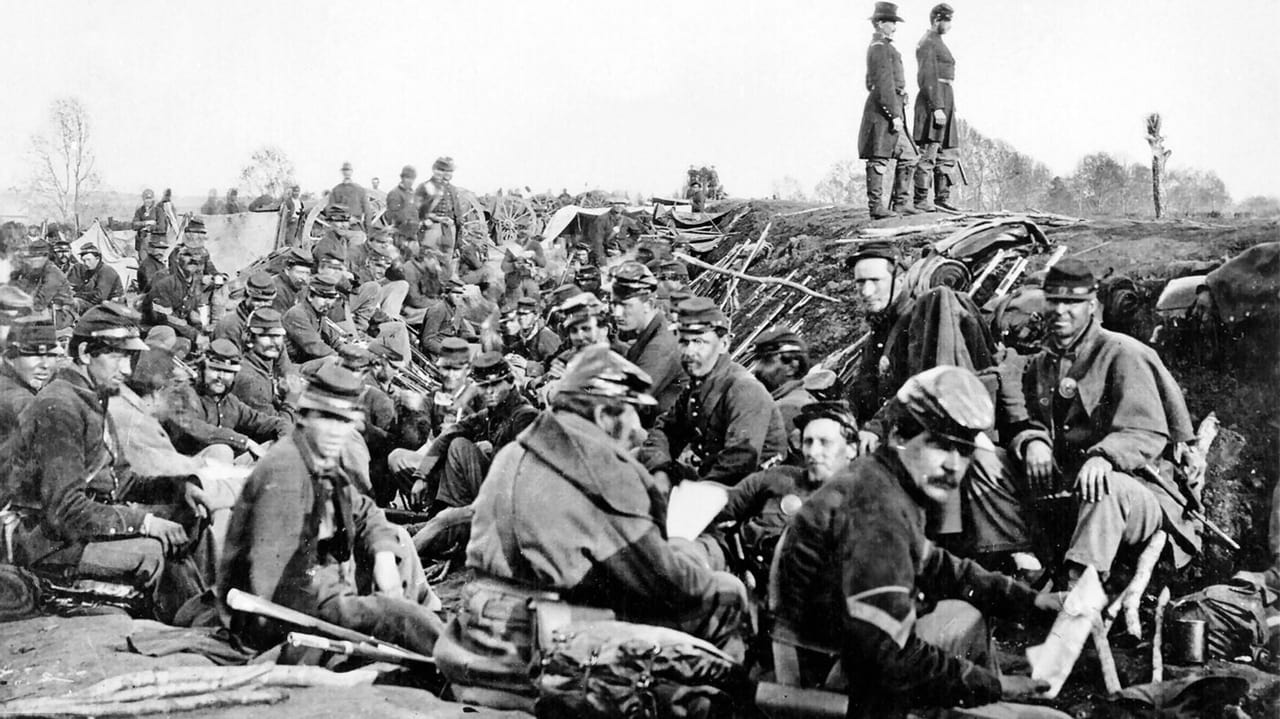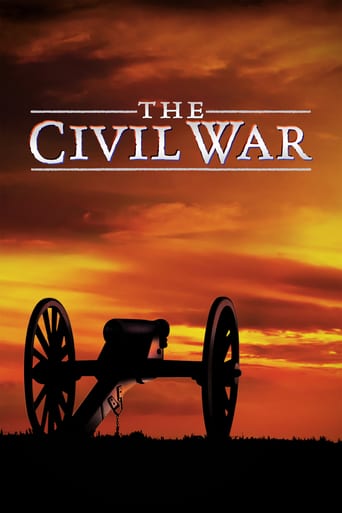

This is a defining TV program produced by documentary filmmaker Ken Burns. He starts with the first episode "The Cause" diving into the slavery issue and the spread of secession. The program follows the major events and battles throughout the war to its conclusion and the aftermath. David McCullough's steady narrations give the material great weight. There is a steady stream of great voice work reading old letters and speeches of that era. The talking heads are limited and they give terrific short comments. Most of the visuals are the black and white photographs but Burns give them movement. This is the most epic of American history done in a way that gives it reverence and substance. Almost everything is perfect from the music to its depth. This is the best of educational American TV.
... View MoreThis movie is very informative and contains a lot of factual history and good content. It's a very good movie if you like to learn and enjoy history and/or the civil war. For me it was a bit boring because I am not a huge history fan, but it was a great learning tool and made learning about the civil war better than just reading out of a textbook. It was a mix of historical pictures and videos with recent pictures and videos of the same places. The whole movie was mostly just historic and older photos with a narrator spitting out facts and events that had occurred. It was a very good movie to show in class. There was no nasty images or bloody battles shown. It was school appropriate and sensitive. A very well screened documentary with a lot of interesting facts.
... View MoreNo war on earth has generated more literature than the American Civil War, most of the story being familiar to most people. So how do you hold the attention of a mass audience for eleven hours?One way is to involve Shelby Foote, who wrote the 3000-page history that will surely never be supplanted as the definitive account of the conflict. Foote manages to look and sound unlike any other Mississippian of 70-plus, despite the authentic Deep South accent. He always said he didn't want to be just another Lost Cause apologist, and he is certainly anything but that. He manages to exude a profound knowledge of this vast subject, edged with creative insight, humour and a unique whimsical charm.As in his book, themes are the key - how to maintain a long narrative thread, with the main events in sequence, but without making it feel like a series of tutorials. Instead of just marching forward, it manages to dance. Dozens of themes glide past each other, some of them major topics like Conscription or the Siege of Petersburg, others quite minor, like home-made hooch or the mysterious 'acoustic shadow' that could make a battle inaudible to troops in the next valley. Like any old soldier, I can connect with the front-line joke about Tullahoma. It comes from two ancient Greek words. One means mud. The other means more mud! And I like the jibe about the beleaguered Confederate President Davis: by the end, he was presiding over a Confederacy of the mind.The spoken quotations from generals and politicians, or from letters and diaries, can seem like rather a conventional treatment - until you start to notice the unusually high quality of speech. These are actually some of the world's most famous actors, as listed in the last frame, if you ever get there. But certainly too conventional is the musical track - same old tunes over and over, all too loud and distracting, and some of the recordings distinctly wobbly.As the slaves' view of the war is emphasised more than usual, I was surprised there was nothing on how the Native Americans felt about it too. And there were some rather odd disembodied statements that didn't seem to relate to anything before or after, as well as some quite unnecessary reminders of what was happening in the rest of the world in each of these years. The historian Ed Bearss seems to think he's in a horror-film, with his strange posture and weird hand-signals, curiously lit as well. His glamorous Afro-American counterpart Barbara Fields appears to carry conviction until she declares that the civil war is not over yet - not while some people live in houses and others on the street. Oh dear, just another PC indoctrinaire after all.Finally, don't miss the diaries of Mary Chesnut, far more sensitive and insightful than you would expect from a fashionable lady of South Carolina. And a clip from the 75th anniversary reunion of Gettysburg veterans (1938, and with sound) is a startling piece of theatre, right there on the battlefield, though I can't help wondering if there might be a few sly gatecrashers among all those fine old boys with their brave white moustaches and rebel yells.
... View MoreThe Civil War (1990) **** (out of 4)For a more detailed look at the episodes, check out their own pages where I've written on each of them.Ken Burns' nine-part series taking a look at the history of The Civil War is without question one of the greatest achievements of any documentary. Clocking in at over twelve-hours, this film doesn't have a single weak moment to be found and it's brutal honesty is something that one has to respect. It really does seem that Burns wasn't interested in taking sides or pushing any of his own political agenda, instead he just delivers a terrific film that gives you a clear idea of what was going on in the country leading up to the war, the attitudes during the war and the downfall after the battles. We get to hear about everything from the first shots being fired to the final man being killed in action. The documentary is so well-detailed that by the time it's over you're really going to feel as if you know everything on the subject and this here is also something very important for any documentary.The nine different episodes cover every inch of the war but some of the most haunting moments deal with the 600,000 plus that were killed during the war. Not only do we hear about the battles but it's also shocking to see how many of the deaths were due to illness and disease and not a gunshot. We also see the horrors that some soldiers found themselves in after being captured and held in Southern prisons that were overflowing with people. The horrors were that the South couldn't feed their own troops let alone all the prisoners. There are some pretty graphic photographs of soldiers that were nothing more than skin and bone and these images are very close to what we'd see decades later with the Holocaust. As with most of Burns' movies, this one here features photographs of the time and these here are certainly priceless and gives one a great view of the destruction caused by the war. Even the assassination of Abraham Lincoln is covered as well as its aftermath.History buff as well as film buffs are really going to love this documentary. I've seen several documentaries on the subjects covered here but having everyone in one package is a major plus and even better is how terrific the stories are told. You see the various ups and downs from both sides and you really get to understand why the war took place, how many times it came close to ending and of course what happened to make the South still not be too fond of the North even after all these years.
... View More